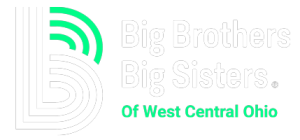Our Commitment to DEI
Together we affirm that every person has the opportunity to reach their full potential. We are committed to creating and cultivating a safe environment where all individuals feel respected and valued equally. We are committed to a nondiscriminatory and anti-racist approach and are committed to dismantling any inequities within our policies, systems, programs and services.
Our Statement
At Big Brothers Big Sisters of Central Ohio, diversity, equity, and inclusion (DEI) is an integral part of our values and mission. We recognize, affirm, and celebrate the diverse backgrounds, lives, and experiences of all of our stakeholders, including youth, families, donors, volunteers, and staff. We ensure the opportunity for all voices and perspectives to be heard and honored. In the workplace, we foster an environment where all people can be their best selves. We affirm that every person [regardless of ability, age, cultural background, ethnicity, faith, gender, gender identity, gender expression, ideology, income, national origin, race or sexual orientation, marital or veteran status] has the opportunity to reach their full potential. We strive to realize the full potential that is within all of us by ensuring that all voices and perspectives are heard and honored.
Find training and educational resources below:
- “When I look at you, I don’t see race.” or “I don’t see color. I’m color-blind.” This disregards the person’s identity, experiences, and historical inequities/injustices.
- “Where are you from?”, “What are you?”, or “Your name isn’t American.” This labels the person as “other”, implying they do not belong.
- “Can I touch your hair?” or “You look so exotic.” This objectifies the person and can make them feel powerless, taking away autonomy they have over their own body.
- “You’re great at science for a girl.” This implies that females are not successful at STEM careers.”
- “You don’t act black.” or “You don’t look gay.” This indicates that there is some “box” that all people of color or those in the LGBTQ community must align with.
An implicit bias is the unconscious attribution of particular qualities and characteristics (both favorable and unfavorable) to a certain social group or status. Implicit biases are typically formed through experiences or learned associations. These attitudes and stereotypes affect our understanding, actions, and decisions towards these groups in an unconscious manner.
Implicit biases are hidden from the person experiencing them, thus are activated involuntarily without the person’s awareness or control. These biases cause us to have feelings and attitudes about other people based on characteristics such as race, ethnicity, age, and appearance.
Implicit biases are pervasive — everyone has them — but they do not necessarily line up with one’s stated beliefs. The great news is that they can also be gradually unlearned over time.
“Your willingness to examine your own possible biases is an important step in understanding the roots of stereotypes and prejudice in our society. Categories give order to life, and every day, we group other people into categories based on social and other characteristics. This is the foundation of stereotypes, prejudice and, ultimately, discrimination.” – Teaching Tolerance
Click here to Take a Test from Project Implicit to assess your own Implicit Biases. Fifteen tests are available, including Implicit Association Tests (IAT) on age, religion, sexuality, skin tone, race, gender-science, and disability.
** Please note: encountering your own Implicit Biases can be challenging and upsetting to some. Please keep this in mind before navigating to the Project Implicit site.
Sometimes the most important conversatoins are the hardest to have. We’re here to help.
George Floyd. Ahmaud Arbery. Breonna Taylor. What do we tell our children?
Black Pain, Black Joy, and Racist Fear: Supporting Black Children in a Hostile World
Here’s Why It Hurts When People Say, “All Lives Matter”
My White Friend Asked Me on Facebook to Explain White Privilege. I Decided to Be Honest
